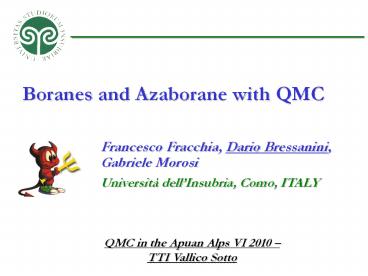Boranes and Azaborane with QMC - PowerPoint PPT Presentation
Title:
Boranes and Azaborane with QMC
Description:
Hydrides Hydrides are potential hydrogen storage materials If H is bound to ... in which the two boron atoms are joined to each other through an unusual type ... – PowerPoint PPT presentation
Number of Views:129
Avg rating:3.0/5.0
Title: Boranes and Azaborane with QMC
1
Boranes and Azaborane with QMC
Francesco Fracchia, Dario Bressanini, Gabriele
Morosi Università dellInsubria, Como, ITALY
QMC in the Apuan Alps VI 2010 TTI Vallico Sotto
2
Hydrides
- Hydrides are potential hydrogen storage materials
- If H is bound to light elements (B, N,)
materials with a high hydrogen content per unit
weight can be obtained - Accurate thermodynamic data are required
- Some thermodynamic properties are not known, or
their accuracy is not good enough
3
A short history of B2H6
- 1912 Boranes first studied by Alfred Stock
- 1925 X-ray, diborane, ethane-like structure?
- 1934 diborane is diamagnetic
- 1937 Bauer (electron diffraction), ethane-like
- only 12 valence electrons. What is the structure?
(Valence Bond theory) - Many hypothesis
4
A short history of B2H6
But diborane does not easily release protons
Ethane-like, but with unpaired electrons
5
A short history of B2H6
- 1940 resonant structures with bridging hydrogens
proposed
- 1941 added ionic structures
6
A short history of B2H6
- 1941 Schlesinger in a letter to Pauling
As a result of our work on the metallo
borohydrides I definitely feel that a structure
for diborane quite different from those generally
proposed, would aid in correlating many of the
observations we have made The structure I
have in mind is a bridge structure, in which the
two boron atoms are joined to each other through
an unusual type of hydrogen bond, perhaps best
represented by the following formula
7
A short history of B2H6
- Paulings reply
I do not feel very friendly toward the structure
which you mention in your letter for the diborane
molecule. So long as the suggested structure
remains vague and indefinite, it is not easy to
say that it is eliminated by electron data or
other data. However, the force constant for the
B-B vibration is I think much stronger than would
be expected for a structure of this type, in
which there is no direct B-B bond
- Later work by Longuet-Higgins, Hedberg and
Shomaker, and especially Lipscomb confirmed the 2
electron 3 center banana bond - 1976 Nobel prize in Chemistry to Lipscomb
8
Dimerization energy of BH3 - experiments
- Dimerization energy BH3 BH3 ? B2H6 difficult to
measure
Author D(B2H6) Year Method
Garabedian et al. 38.3 1964 Kinetic
Fehlner et al. 37.1 4 1964 Kinetic
Burg et al. 35.0 1966 Kinetic
Sinke et al. 55 8 1964 Mass spectroscopy
Fehlner et al. 39 1964 Mass spectroscopy
Wilson et al. 59 1967 Mass spectroscopy
Ganguli et al. 59 1969 Mass spectroscopy
Fehlner et al. 36 3 1969 Mass spectroscopy
Ruscic et al. (34.3 - 39.1) 2 1988 Many sources
9
Dimerization energy of BH3 ab initio
10
QMC calculations
- FN-DMC calculations for BH3, B2H6, BH3CO, BH2
- Orbitals from B3LYP always slightly better than HF
Psi Basis set MO HF MO B3LYP ? (mhartree)
BH3 1 det DZp -26.5960 (1) -26.5969 (1) -0.9
BH3 1 det Thdqz3p -26.5971 (1) -26.5979 (1) -0.8
BH3 1 det CH-qz3p -26.5976 (1) -26.5980 (1) -0.4
BH3 2 det CH-qz3p -26.5978 (1) -26.5980 (1) -0.2
B2H6 1 det DZp -53.2596 (4) -53.2639 (2) -4.3
B2H6 1 det Thdqz3p -53.2625 (2) -53.2654 (2) -2.9
B2H6 1 det CH-qz3p -53.2638 (3) -53.2651 (1) -1.2
- The Y could not be improved by adding determinants
11
Intermezzo
- A single determinant can be improved using a
Backflow Transformation - However using Backflow alone, on a single
determinant Y is not sufficient, since the
topology is still wrong
We still must add determinants or use a different
functional form
12
Intermezzo
- If the 2-nodal regions conjecture is true
- The Kohn-Sham wave function, even with the exact
exchange-correlation, has the wrong nodal
topology (Nodal regions gt 2) - Wrong Y but exact density and energy
- In QMC we use Y from DFT
- Should we trust it?
- Why does it give better nodes than HF?
13
Dimerization energy of BH3 QMC
This work FN-DMC
-37.04(1) Experimental
(-39.1 -34.3)
2
14
Azaborane
- Azaborane BH3NH3 is a stable, nontoxic solid
- 19.5 by weight is hydrogen.
- High melting point (110-114C) due to dihydrogen
bond B-Hd-dH-N - Can release hydrogen reversibly
- nBH3NH3? BH2NH2nnH2
15
Azaborane
- However
- No efficient regeneration process is known
- Lack of experimental data
- Dissociation energy has not been measured
- BH3NH3 ? BH3 NH3
- Few ab initio calculations
16
Azaborane
- FN-DMC
- Single determinant, B3LYP orbitals Jastrow
- ZPE and thermal corrections computed with GAMESS
- Comparison with other calculations
Author Method ?Ebond ?Hdiss(0K) ?Hdiss(298K)
Ricca et al. CCSD(T)/aug-cc-pVTZ 31.1 24.6
Dixon et al. CCSD(T)/CBS 31.64 25.92 27.7
Present work FNDMC 31.6(2) 25.6 27.4
17
NH3, comparison
- Total energy of NH3
Method N basis set Energy (hartree)
CCSD(T)/aug-cc-pVTZ 130 -56.497886
CCSD(T)/aug-cc-pVQZ 270 -56.527293
CCSD(T)/aug-cc-pV5Z 365 -56.538421
CCSD(T)/aug-cc-pCV5Z 434 -56.55922
FN-DMC CH-qz3p 87 -56.5527 (1)
18
Other calculations (NH3,NH4)
- Protonic Affinity of NH3
- NH3 H ? NH4
- Effect of diffuse functions in basis set
Basis set E(NH3) E(NH4) PAelec (kcal/mol)
CH-qz3p -56.5527 (1) -56.8914 (2) 212.6 0.25
aug-CH-qz3p -56.5528 (2) -56.8916 (2) 212.6 0.25
19
Other calculations (NH3,NH4)
Method basis set PAelec(kcal/mol)
MP2 aug-cc-pVQZ 210.59
MP3 aug-cc-pVQZ 212.62
MP4 aug-cc-pVQZ 211.48
CCSD aug-cc-pVQZ 212.8
CCSD(T) aug-cc-pVQZ 211.82
CCSD(T) aug'-cc-pV5Z 211.83
FN-DMC CH-qz3p 212.6 0.25
20
Conclusions
- Boron compounds are chemically very interesting
- There is still work to do
- Rather small molecules
- QMC seems well suited, even for larger boranes































